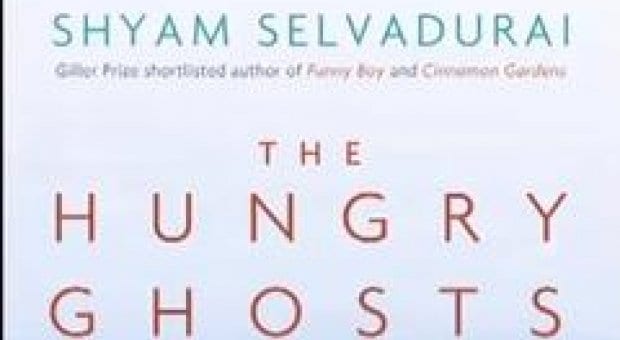Published almost 20 years ago, Shyam Selvadurai’s acclaimed first book, Funny Boy, is about a gender-creative young Tamil boy growing up in Sri Lanka amidst the Tamil/Sinhalese conflict. In many ways, Selvadurai’s new book, The Hungry Ghosts, is the triumphant and heartbreaking completion of the journey that began in Funny Boy.
The Hungry Ghosts is also partially set in Sri Lanka, this time shown through a Sinhalese lens. As a young boy, Shivan is used as a bargaining chip by his mother to acquire housing and financial support from her estranged mother, who immediately falls in love with Shivan’s beauty, innocence and intelligence. Because of this unspoken arrangement between his mother and his grandmother, Shivan’s life is never really his own.
Shivan’s grandmother is the most striking character in The Hungry Ghosts. She commands fear, even in silence, while also summoning a deep, inexplicable love and the reverence reserved for family elders. “Her character just grew and grew and grew,” Selvadurai says of the grandmother’s larger-than-life quality. “The moment I created her, sitting on her bed, polishing her silver teapot, she was there to stay.” Her unpredictable personality, her stubbornness, benevolence and cruelty irrevocably shape Shivan’s childhood in ways that haunt him throughout the book.
The need to escape his grandmother propels Shivan and his family to move to Toronto. “I really felt it was important to write about the Canada I came to,” Selvadurai says, noting he had not yet explored this experience in his writing. “It was one of those inner-ring suburbs . . . with no real centre to them. So when you arrive, coming from a culture where there is a lot of street life and a lot of easy contact between human beings all the time, you feel parched, you feel thirsty. And then of course, there is absolute terror of the weather.”
As Shivan wrestles with reconciling his past and trying to find forgiveness for his mother and grandmother, he and his family must also bear the harsh realities of immigrant life, the devastating discovery that a new home is not without its own challenges.
Like Arjie in Funny Boy, Shivan is gay. Selvadurai explains that because he is gay, his rule is “if the character can be, then let them be gay. I always start with the assumption that the protagonist is gay.” However, unlike Arjie, Shivan’s desires extend beyond childhood curiosity. “He is much more of a practising gay . . . he has a lot of sex. Also, he is differently gay because he is part of a modern-day gay ethos – he comes out, he’s in gay environments, he has a spouse.”
Shivan’s sexual experiences are all written with tenderness and nuance, even the negative early experiences. “It’s a rite of passage – the first gay experience is terrible. You are basically fresh meat,” Selvadurai says. Perhaps one of the most radical and important aspects of the book is the descriptions of brown bodies and skin – written by a brown author- especially in contrast to the whiteness of mainstream gay sex stories.
Selvadurai cites his recent fascination with Buddhism and his desire to carefully weave Buddhist mythology into the story, without exotification, as one of the reasons The Hungry Ghosts took 13 years to write. Occasionally, these myths are distracting, as the central story is compelling on its own, but in general they create an element of fantasy and the sense that there are larger forces behind the character’s choices and conflicts. Selvadurai says “the thing about the hungry ghosts is that, no matter how much they consume, they can never be satisfied, because their karma has created them always hungry.” As the book closes, a new truth is revealed: we are still hungry for more Selvadurai.
The Hungry Ghosts
Shyam Selvadurai
Doubleday
$29.95



 Why you can trust Xtra
Why you can trust Xtra


